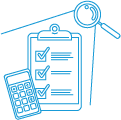Many NDIS businesses that offer in-home services employ manual tools and methods for their administration and finance tasks.
This can work in the very early stages of a small business – at least for a while. 
But as the business grows and expands, using manual methods becomes inefficient.
Manual tasks might take up a lot of time and result in siloed information that isn't accessible to everyone who needs it, or information that isn't up-to-date and accurate.
The benefits of automating
On the other hand, using digital tools to automate your NDIS business comes with a lot of advantages.
These include:
Saving time and money
Automated digital processes help you make substantial time and cost savings by reducing the hours (and staff members) needed for administration tasks. You can also save time by feeding your data into the NDIS portal, which in turn allows for automated bulk claiming.
Greater accuracy and accessibility of information
Some businesses providing in-home services record written information and notes in a journal at the participant’s home. But by having all information entered via a mobile device such as an iPad, you make it accessible to anyone that needs to see it.
Improvements in staff management and rostering
If some of your higher-level staff are regularly working longer shifts, it can end up being expensive in terms of overtime. Digital rostering systems enable you to see who is doing what, and share overtime work more evenly. This can help reduce payroll costs by as much as 15%. The use of automated timesheets also helps reduce errors and improve payroll accuracy.
Improved ability to meet participant needs
Digital rostering systems help ensure the right carers are matched to participants in terms of skills, gender, personalities, health needs, allergies and other personal requirements. Many systems can also help to set individualised goals for participants and ensure that the care plans put in place align with both the requirements and goals.
Centralising your data online helps to create more consistency of support, and in turn improve the participant experience. For example, carers can have up-to-date access to important information about a participant’s needs and any issues that have arisen before they even arrive at the home.
So where to start?
Automation can save you money, improve the participant experience, help you provide better quality services, enable you to grow your business and generally make operations easier. But where do you start?
We have found that NDIS business owners are often under the impression they need a customer relationship management (CRM) program. When in fact, a CMS or care management system would serve them better.
CMS programs can take care of client records and notes, and administration tasks such as rostering and automatic billing and invoice generation from the roster. Some also come with more advanced features that look after compliance and administration needs – such as plan renewals, service agreements, training, first aid certificates, and tracking of NDIS accreditation and registration.
But if you are not yet ready to invest in a CMS, there is also the option of starting small and scaling up. Timesheets for example offer a good starting point for testing out the automation process, and often provide some early quick wins.
It's also important to be aware that switching from manual to automated processes can be difficult at first, as it involves creating new habits and mindsets. For example, we have found that it can be hard for staff members to get used to completing automated timesheets! So factor in the need for staff training, and get their buy-in on new processes that will make their jobs easier.
How RSM can assist
Successful automation requires a full understanding of your business’s needs, goals and drivers. RSM can help you drill down into your requirements and find the right type of automation tools to match. Contact us to discuss your needs, and check out our step-by-step guide to choosing automation software.
FOR MORE INFORMATION
If you would like to learn more about the topics discussed in this article, please contact your local RSM office.



